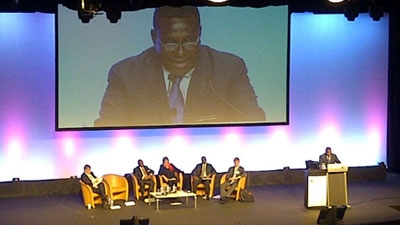This week the EITI, Extractive Industries Transparency Initiative, the global standard for transparency of revenues from natural resources, is holding its 2013 Global Conference in Sydney, Australia. Launched in 2003, the EITI promotes and supports improved governance and transparency in resource-rich countries. The focus of the conference has particular resonance in some of Australia’s resource-rich neighbours, Solomon Islands, Timor-Leste and Papua New Guinea.
Timor-Leste was the first country in the Asia-Pacific and the third in the world to become compliant with the EITI. Solomon Islands was the first country in the Oceana to become an EITI candidate country and Papua New Guinea has signaled its commitment to implement the EITI.
Solomon Islands Prime Minister, the Hon. Gordon Darcy Lilo, was one of the keynote speakers at the opening session of the biennial EITI global conference, which has attracted delegates from about 100 countries around the globe to Sydney to share best practices on natural resource management.
In his address, the Prime Minister said it was “crucial for the benefits from extractives to be managed in the best possible way” and to let “revenues be a positive force for the people.”
He also stressed that establishing the consultative, consensus building and transparency mechanisms associated with EITI would also help reduce the risk of conflict and repeated the “unfortunate legacies of the past.”
“The road ahead is challenging, but not impossible,” he told the conference delegates. The Prime Minister also noted the support of the World Bank. Signing onto the EITI runs in parallel to initiatives taken to modernize the mining sector, in collaboration with the World Bank. The government is currently in talks with the Bank to provide ongoing support to update its mining law and regulatory framework to promote the development of an industry that is environmentally and socially responsible.
“The key challenge for all countries to is help turn natural resources like oil, gas and minerals, into a powerful force for inclusive and sustainable growth, “ said Franz Drees-Gross, the World Bank’s Country Director for the Pacific. “ Greater transparency can not only help reduce the risk of conflict over resources, but also help create better deals, which are managed better for more development impact. “
Chair of the EITI, Clare Short, told the conference 39 countries will be now implementing the EITI standard, which requires full disclosure of taxes, royalties and other fees from the country’s oil, gas and mining sectors.
The two day conference is expected to hear a report from the board by Alfredo Pires, Minister for Petroleum and Natural Resources, Timor-Leste, as well as a pledge from Don Pomb Poyle, Treasurer, Papua New Guinea on how the country plans to implement EITI.
What’s it all about?
The EITI is made up of governments, companies and civil society groups that endorse and promote the transparent management of a country’s extractive industries, such as oil, gas and mining. At the conference, a strengthened EITI standard has been adopted.
Natural resources are a large source of revenue for many countries around the world, however, without good management the local community may not feel the benefits and sustainable practices may not happen, leaving the country without a large source of income. Moreover, conflict and corruption can, and often does, arise. In the Solomon Islands, for example, resource related problems were found to be a contributor towards the country’s tensions between 1998 and 2003.
The World Bank promotes the EITI as part of its response to the Extractive Industries Review as well as through broader programs aimed at improvements in natural resource management, good governance and anti-corruption.
“By signing onto EITI, countries are sending a clear message that they want to increase transparency and accountability when it comes to their natural resources,” said Paulo de Sa, manager of the World Bank’s Oil, Gas and Mining Unit. “This transparency is fundamental to helping ensure that the benefits of a country’s natural resources can help developing nations in their quest to reduce poverty and boost shared prosperity.”
The World Bank’s oil, gas, and mining unit provides countries with technical assistance and grants to implement the EITI principles of revenue transparency and accountability, and to support capacity building for civil society. Funds for this purpose have been contributed to a multi-donor trust fund (MDTF) managed by the Bank and supported by 15 donor countries including Australia, Belgium, Canada, Denmark, the European Commission, Finland, France, Germany, Japan, the Netherlands, Norway, Spain, Switzerland, the UK and the US.
Just a beginning
In Papua New Guinea, mining and petroleum alone make up for one-third of its tax revenue, 80 percent of the total national export income and 24 percent of the GDP. The World Bank is supporting Papua New Guinea’s moves to commit to EITI, as Jerry Bagita, Operations Manager for Transparency International (TI) PNG noted “in many respects the World Bank has been very supportive of TIPNG efforts to drive the EITI agenda on behalf of the wider society in PNG and for this we are very grateful.”
A staunch supporter of the EITI standard, The World Bank continues to work alongside many other activities across the Pacific to improve compliance such as a US$230,000 grant from the EITI multi-donor trust fund to support Timor-Leste’s admission to the EITI in 2010.
It may just be the beginning but these are important steps as Timor-Leste, Solomon Islands, and PNG look to ensure their oil, mining and gas industries are transparent, sustainable and beneficial for their communities.

